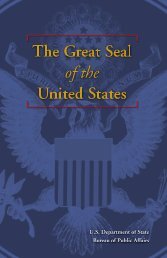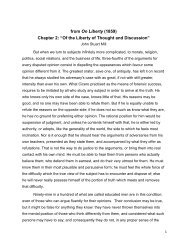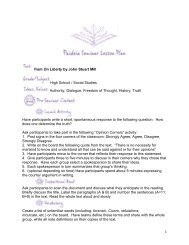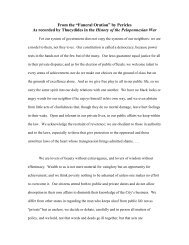Rousseau_contrat-social
Create successful ePaper yourself
Turn your PDF publications into a flip-book with our unique Google optimized e-Paper software.
a matter of policy. Thus, the comitia might not be held on festivals or<br />
market-days, when the country-folk, coming to Rome on business, had not<br />
time to spend the day in the public square. By means of the third, the<br />
senate held in check the proud and restive people, and meetly restrained<br />
the ardour of seditious tribunes, who, however, found more than one way<br />
of escaping this hindrance.<br />
Laws and the election of rulers were not the only questions submitted to<br />
the judgment of the comitia: as the Roman people had taken on itself the<br />
most important functions of government, it may be said that the lot of<br />
Europe was regulated in its assemblies. The variety of their objects<br />
gave rise to the various forms these took, according to the matters on<br />
which they had to pronounce.<br />
In order to judge of these various forms, it is enough to compare them.<br />
Romulus, when he set up curia, had in view the checking of the senate by<br />
the people, and of the people by the senate, while maintaining his<br />
ascendancy over both alike. He therefore gave the people, by means of<br />
this assembly, all the authority of numbers to balance that of power and<br />
riches, which he left to the patricians. But, after the spirit of<br />
monarchy, he left all the same a greater advantage to the patricians in<br />
the influence of their clients on the majority of votes. This excellent<br />
institution of patron and client was a masterpiece of statesmanship and<br />
humanity without which the patriciate, being flagrantly in contradiction<br />
to the republican spirit, could not have survived. Rome alone has the<br />
honour of having given to the world this great example, which never led<br />
to any abuse, and yet has never been followed.<br />
As the assemblies by curiæ persisted under the kings till the time of<br />
Servius, and the reign of the later Tarquin was not regarded as<br />
legitimate, royal laws were called generally leges curiatæ.<br />
Under the Republic, the curiæ, still confined to the four urban tribes,<br />
and including only the populace of Rome, suited neither the senate,<br />
which led the patricians, nor the tribunes, who, though plebeians, were<br />
at the head of the well-to-do citizens. They therefore fell into<br />
disrepute, and their degradation was such, that thirty lictors used to<br />
93











